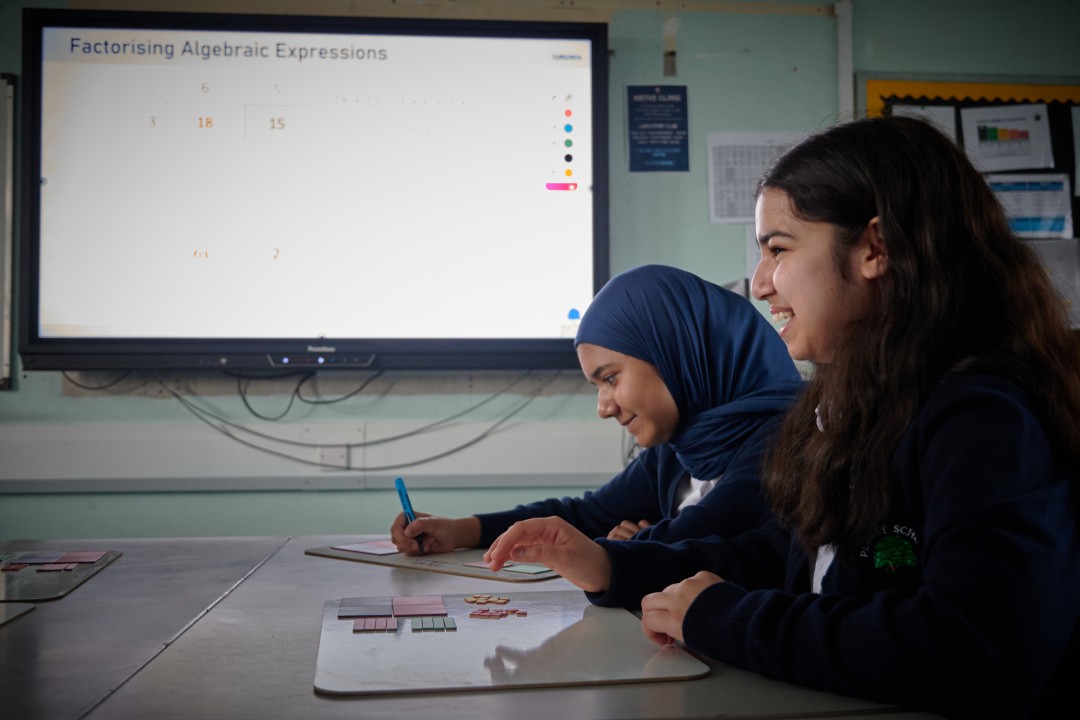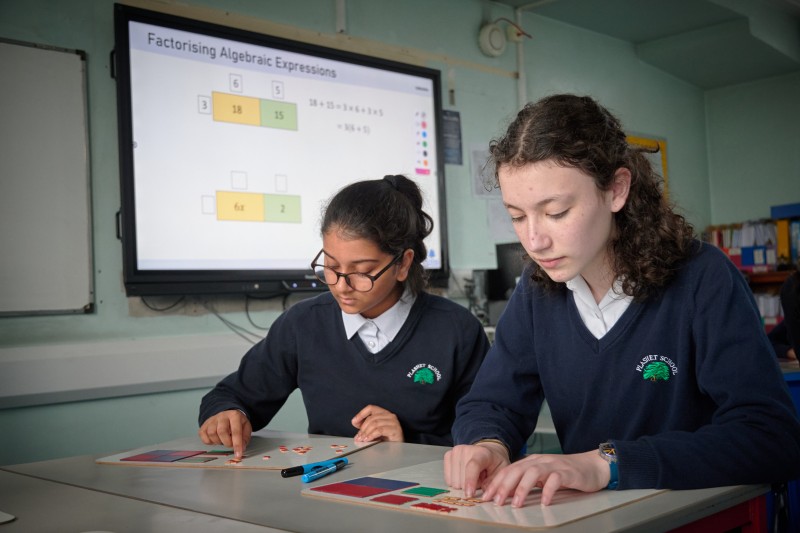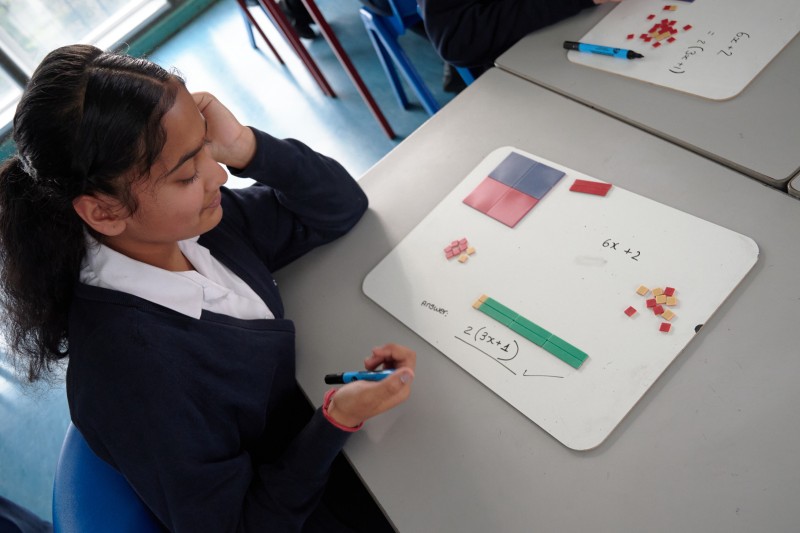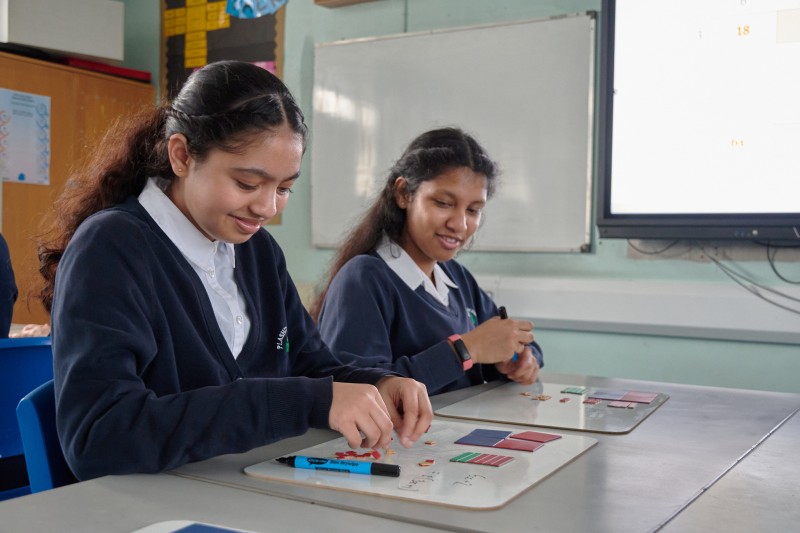Creating a collaborative culture with teaching for mastery
Discover how Secondary Mastery Specialists are transforming maths teaching in an inner-city London girls’ school
23/10/2025

At Plashet School in East Ham, a diverse girls’ comprehensive, collaboration and careful planning have transformed maths teaching. Supported by London North East Maths Hub, their maths department has built a shared approach that strengthens understanding, confidence and enjoyment of maths across the school.
Creating a collaborative culture with teaching for mastery
Plashet School is a large girls’ comprehensive in East Ham, London, drawing students from across Newham and its neighbouring boroughs. It serves a highly diverse community, where more than 80% of its students speak English as an additional language, over half come from disadvantaged backgrounds, and around 15% have recently arrived in the UK.
When Naziya Begum joined Plashet in 2023, she brought experience from working with her local Maths Hub as a Mastery Advocate. Soon after joining, she began the Secondary Mastery Specialist Programme with the Maths Hub and later became assistant head of department. With both the head of department and Key Stage 3 coordinator already involved with the Maths Hub, the team was well placed to further strengthen its teaching for mastery approach.
‘It really began when we realised that many of our students coming from feeder primary schools had a deep understanding of maths,’ says Naziya. ‘But the way we were teaching in secondary didn’t align with how they’d learned before. It felt as though we were undoing their understanding, which prompted us to explore how we could build on their primary experiences.’
Building on strengths and bridging gaps
Working closely with the headteacher, the department identified a clear goal: to create continuity from primary to secondary and to build a coherent journey from Year 7 to GCSE. A new school improvement plan placed teaching for mastery at the centre of maths development.
‘Our headteacher has been hugely supportive,’ says Naziya. ‘She’s given us the time and flexibility to embed mastery across the department. Working collaboratively has really accelerated the process, and the school’s culture is very supportive. Our leadership clearly sees the bigger picture.’
Time, collaboration and reflection
Teaching for mastery has become deeply embedded in the department’s day-to-day work. Weekly one-hour meetings focus on representations, questioning and sequencing, with teachers reflecting on what works, what doesn’t, and what to adjust.
‘Our headteacher believes that if teachers don’t have time to plan and collaborate, teaching and learning won’t be good. That philosophy has made a huge difference.’
The department’s professional dialogue doesn’t stop at planning. ‘When we plan a unit collaboratively, we follow it through,’ she explains. ‘Once it’s been taught, we ask: what went well? What was different from how you’ve taught this before? What would you change next time? That process has really helped teachers become reflective practitioners.’
Developing confident mathematical talk
With so many students learning English as an additional language, the school has a strong focus on oracy and the use of precise mathematical language. ‘It started with me stepping back and allowing students time to have meaningful conversations where mathematical thinking could develop,’ Naziya explains.
‘In the early stages we used sentence starters and prompts, but now talk happens naturally. Students debate ideas. They want to be right, but they know they have to prove their thinking and justify it. I never shut them down. Every answer is acknowledged and appreciated.’
During lessons, Naziya listens in on discussions and uses what she hears to structure class feedback. ‘I’m selective about who I ask to speak because I’ve already heard what they said, and I know how their answer will build on others. I sequence responses so one student’s contribution leads naturally to the next.’
This approach has transformed the classroom atmosphere. ‘Students feel safe making mistakes and exploring ideas,’ she says. ‘They know that discussion helps everyone learn.’
Measurable impact on teaching and learning
The impact of this work is clear in both teaching and student outcomes. ‘When my head of department and I carry out learning walks, we can see these rich discussions happening across classrooms,” says Naziya. ‘It’s not just one or two teachers involved in the Maths Hub – the approach has spread across the whole department.’
Representations such as bar models, ratio tables, algebra tiles and double number lines are now commonplace in students’ work. ‘They’re thinking more deeply and can explain their reasoning,’ she adds. ‘The shift from learning methods to developing understanding is really helping students see themselves as mathematicians.’
The benefits extend beyond lessons. ‘More girls are now choosing STEM subjects post-16,’ says Naziya. ‘That’s exactly what we want to encourage. Traditionally, girls don’t perform as well as boys in maths, but we’re breaking through those barriers.’
Research, professional growth and sustained improvement
Plashet’s culture of research and collaboration also extends beyond maths. ‘Performance management here is strongly research-based,’ explains Naziya. ‘My targets have focused on embedding mastery and developing teachers. I’ve also been part of a whole-school working group on oracy in mathematics, alongside others on writing, lesson design and student motivation.’
Teachers explore research, trial ideas in class, and come together to discuss impact. ‘It supports a reflective culture across the whole school,’ she says. ‘It’s one of the reasons our department continues to move forward.’
Looking ahead
For Naziya, the combination of strong leadership, research-informed practice and deep collaboration has created the conditions for sustained improvement. ‘When I came in with my knowledge as a Mastery Specialist and we really started working together as a department, it fast-tracked everything,’ she says. ‘Everyone can see the big picture and wants to keep moving forward.'
Become a Secondary Mastery Specialist
Applications for the Secondary Mastery Specialist Programme in 2026/27 are now open, the application window closes on 23 April 2026.
Find out more and apply

